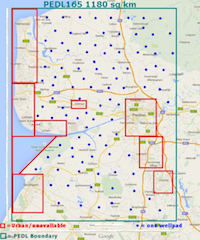Over the moon or sick as a parrot?
Today’s news is the discovery, by researchers from the University of Aberdeen, that high levels of a potentially toxic chemical have been discovered in rock samples taken from an area of the UK targeted for shale gas extraction.
The chemical in question is Selenium, and the area concerned is the Bowland Shale, the geological formation in the north of England rich in shale gas. According to The University of Aberdeen
“The significance of the discovery lies in the risk of high levels of the element being released into groundwater during drilling or ‘fracking’ operations. ”
and according to the report itself
“Following concern over the release of Se and As into groundwater during shale gas extraction in the US, the potential fate of Se and As during any future shale gas extraction from the Bowland Shale merits attention.”
Selenium is an interesting element – it is in fact necessary for life and selenium deficiency can lead to health problems. It is present in many sources from shale rocks to Brazil nuts.
 Like many things you can have too much of a good thing and indeed, cases of selenium poisoning in Amazon peoples following consumption of nuts have been reported in Brazil. These incidents resulted in “nausea, vomiting, chills, diarrhea, hair and nail loss, painful joints, and death in some cases”
Like many things you can have too much of a good thing and indeed, cases of selenium poisoning in Amazon peoples following consumption of nuts have been reported in Brazil. These incidents resulted in “nausea, vomiting, chills, diarrhea, hair and nail loss, painful joints, and death in some cases”
According to Professor John Parnell
“A major factor to be considered during shale gas drilling is the accompanying water, which may contain chemicals that require careful treatment. Recently, there was widespread concern in the US when water wells near a shale drilling site were found to contain selenium at levels that exceeded the maximum amount considered safe to drink, and this was assumed to have been released from the shale during drilling.
“The samples we have analysed from the Bowland Shale are some of the most selenium-rich in the British Isles, and far in excess of the levels of selenium found in the US example.
“Indeed, a number of the samples we tested exceeded the far stricter European Union limits, so it is clear that any drilling to extract shale gas in the Bowland Shale area must be carefully managed.”
Of course we have to keep a sense of perspective here – the extent to which the samples exceed the limits coupled with the likely risk of contamination will determine just how serious this new finding is for the industry, but for now this is clearly yet another potential cause for concern with this rather toxic industry. What is clear is that this is yet another potential risk for which we have to rely on our “robust” regulatory system for protection.
STV News reports that
“The discovery, by researchers from the University of Aberdeen, could have serious implications for companies hoping to frack in Britain”
It will be very interesting to see what comes of this new revelation.



























